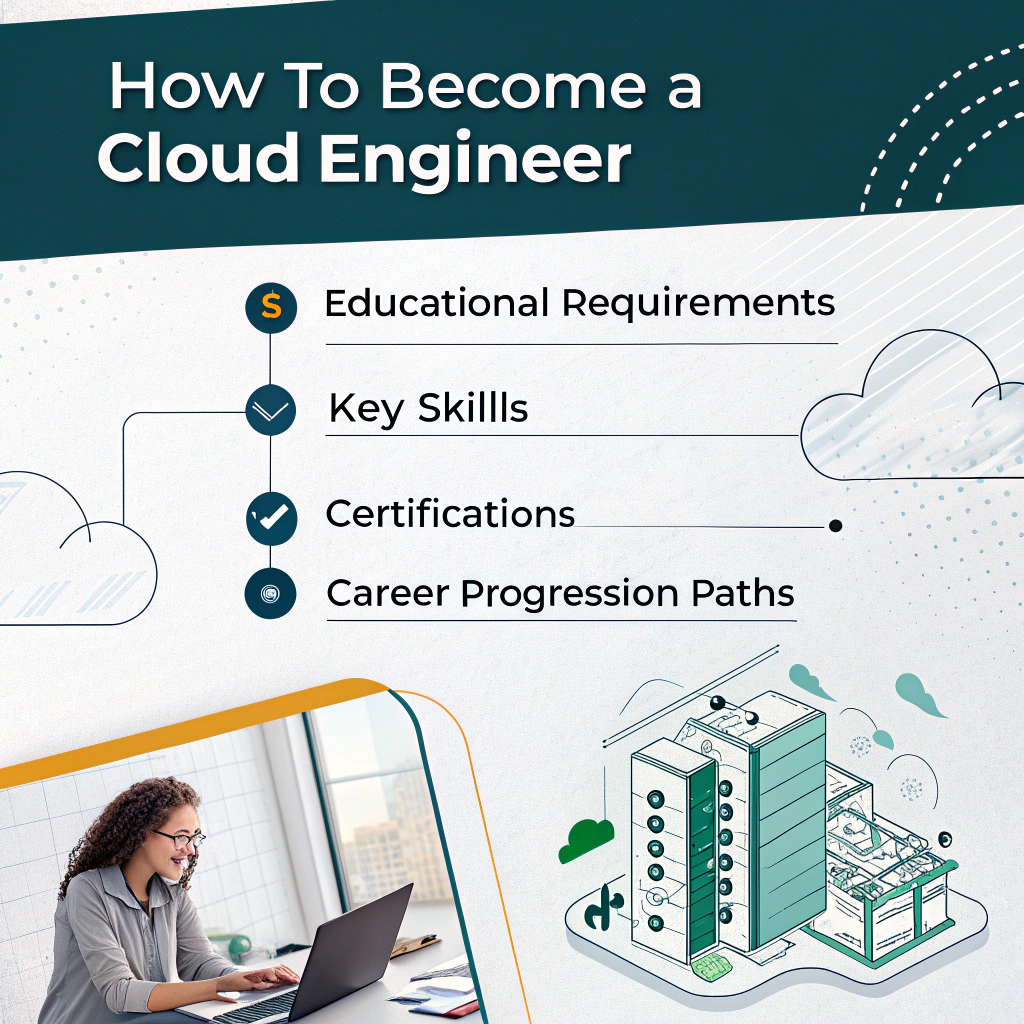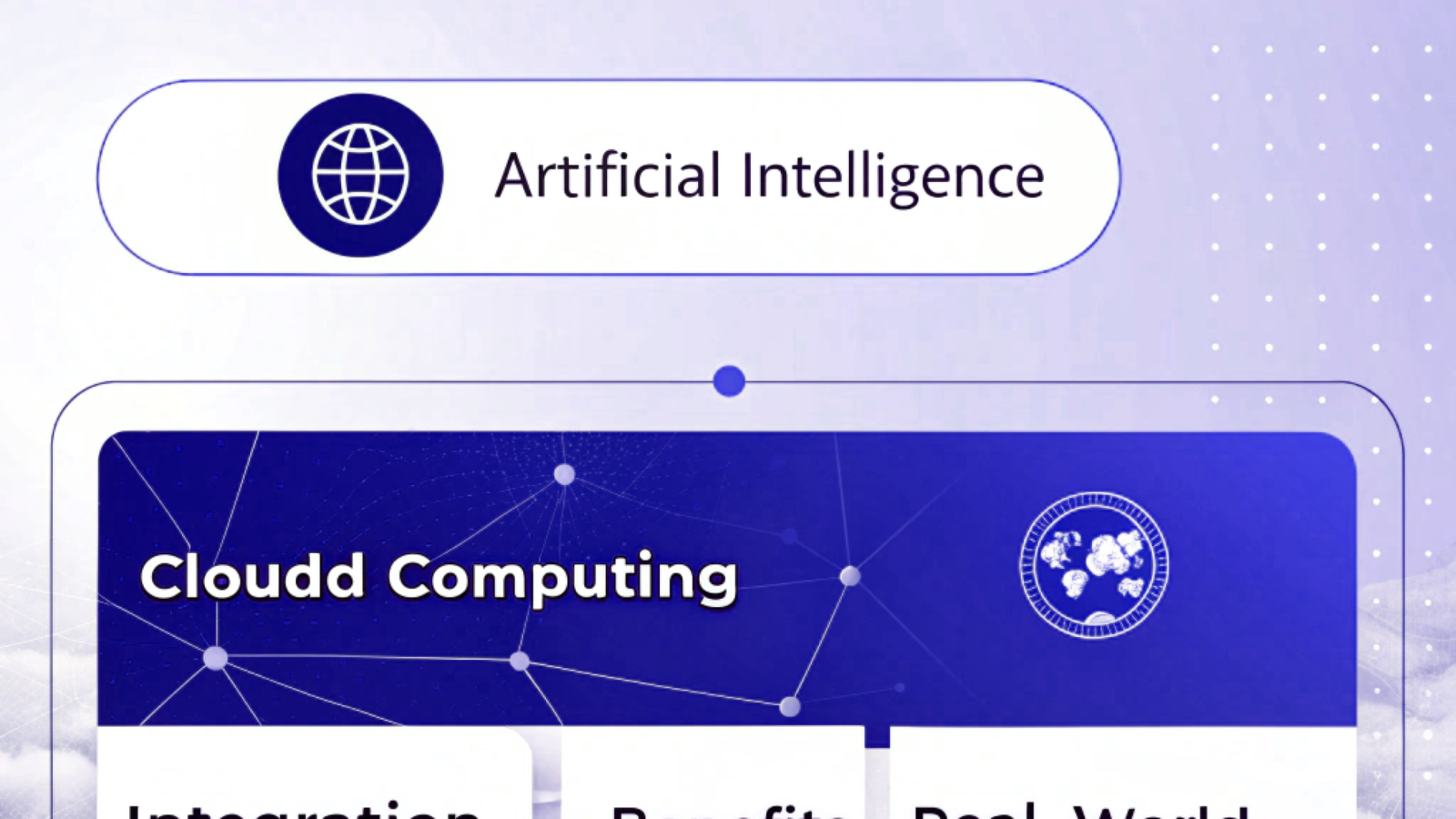Currently Empty: ₹0.00
How to Become a Cloud Engineer: Skills, Salary & Career Guide 2025

Introduction
In today’s fast-paced digital era, cloud computing has become the backbone of modern businesses, enabling organizations to scale efficiently, reduce costs, and innovate rapidly. With this technological shift, the demand for skilled professionals who understand cloud infrastructure is skyrocketing. If you’re aiming for a lucrative and future-proof career, learning how to become a cloud engineer is one of the smartest decisions you can make.
What is a Cloud Engineer?
A cloud engineer is responsible for designing, managing, and maintaining cloud infrastructure. To understand how to become a cloud engineer, it’s essential to know the types of roles available:
Cloud Solutions Architect – Plans and designs cloud solutions.
Cloud Developer – Builds applications in the cloud environment.
Cloud System Administrator – Manages cloud operations and security.
Knowing these roles helps you choose a path that aligns with your career goals.
The demand for cloud engineers has skyrocketed in recent years, with businesses increasingly relying on cloud technology for flexibility, cost efficiency, and innovation.
Why Choose a Career as a Cloud Engineer?
High Salary Potential
Cloud engineers are among the highest-paid professionals in IT. According to Glassdoor, the average salary of a cloud engineer in India ranges from ₹6 LPA to ₹25 LPA depending on experience and skills. Globally, senior cloud engineers can earn $120,000+ annually.
Job Security and Demand
With the rise of digital transformation, businesses are increasingly moving to the cloud. Reports from LinkedIn show cloud computing skills are consistently among the top in-demand IT skills worldwide.
Career Growth Opportunities
From cloud engineer, you can advance to roles like Cloud Architect, DevOps Manager, or Cloud Consultant, opening doors to leadership positions and consulting roles.
Work Flexibility
Cloud engineers can work remotely, as cloud infrastructure can be managed from anywhere. Many companies offer flexible working options, making this a highly desirable career.
Essential Skills for How to Become a Cloud Engineer
To successfully learn how to become a cloud engineer, you must develop both technical and soft skills:
Technical Skills
Cloud Platforms: AWS, Azure, Google Cloud
Programming Languages: Python, Java, or Go
Networking & Security: Understanding cloud networks, firewalls, and encryption
DevOps Tools: Docker, Kubernetes, Jenkins
Soft Skills
Problem-solving
Communication and teamwork
Analytical thinking
Educational Path to Become a Cloud Engineer
While there’s no fixed degree requirement, most cloud engineers come from a computer science, IT, or engineering background. Here’s a recommended path:
10+2 Education – Focus on Science and Mathematics.
Bachelor’s Degree – B.Tech, BCA, or B.Sc in Computer Science/IT.
Internships & Projects – Gain practical experience with cloud technologies.
Certifications – These boost credibility and improve hiring potential:
AWS Certified Solutions Architect
Microsoft Certified: Azure Administrator
Google Professional Cloud Architect
CompTIA Cloud+
You can explore cloud computing courses at Cambridge Infotech to kickstart your career.
Step-by-Step Guide: How to Become a Cloud Engineer
Becoming a cloud engineer requires a combination of education, technical skills, certifications, and hands-on experience. Follow this comprehensive roadmap to build a successful career in cloud computing.
Understand the Basics of Cloud Computing
Before diving into certifications or coding, you need a strong foundation in cloud concepts:
Cloud Service Models: IaaS, PaaS, SaaS
Deployment Models: Public, Private, Hybrid, and Multi-Cloud
Benefits of Cloud: Scalability, cost-efficiency, and flexibility
Understanding these fundamentals gives you a clear picture of how businesses leverage cloud platforms.
Choose a Cloud Platform to Specialize In
There are several major cloud platforms:
AWS (Amazon Web Services) – Industry leader, most in-demand skills
Microsoft Azure – Widely used in enterprise environments
Google Cloud Platform (GCP) – Growing rapidly, strong in AI/ML integration
Focus on one platform initially to build expertise, then expand your knowledge to multiple platforms.
Learn Programming & Scripting
While cloud engineers don’t always need to be hardcore developers, programming skills are essential for automating tasks, managing infrastructure, and building cloud applications.
Recommended languages: Python, Java, Go, Ruby
Scripting tools: Bash, PowerShell
Gain Hands-On Experience
Practical experience is crucial. Start small and gradually tackle complex tasks:
Deploy virtual machines and databases on your chosen cloud platform
Set up storage solutions and network configurations
Use containerization tools like Docker and orchestration tools like Kubernetes
Practice creating CI/CD pipelines using Jenkins or GitHub Actions
Free cloud tiers (AWS Free Tier, Azure Free Account, GCP Free Tier) provide a great environment for experimentation without any cost.
Get Certified
Certifications validate your skills and significantly improve hiring potential. Recommended certification path:
Beginner: AWS Certified Cloud Practitioner / Azure Fundamentals (AZ-900) / GCP Cloud Digital Leader
Intermediate: AWS Solutions Architect Associate / Microsoft Azure Administrator / GCP Associate Cloud Engineer
Advanced: AWS Solutions Architect Professional / Azure Solutions Architect Expert / GCP Professional Cloud Architect
Build a Strong Portfolio
Showcase your skills with real-world projects:
Deploy a fully functional web application in the cloud
Set up a secure, multi-region database
Automate infrastructure using Terraform or Ansible
Document all projects on GitHub or a personal portfolio site
Employers value candidates who can demonstrate hands-on cloud expertise, not just theoretical knowledge.
Network and Gain Industry Exposure
Join cloud-focused LinkedIn groups, forums, and online communities
Attend webinars, workshops, and tech conferences
Engage with cloud professionals and mentors for guidance and referrals
Apply for Cloud Engineer Roles
Start with roles such as:
Junior Cloud Engineer
Cloud Developer
DevOps Engineer
Cloud Systems Administrator
Tailor your resume to highlight certifications, technical skills, and cloud projects. Use job portals, LinkedIn, and company career pages to apply.
Keep Learning and Upskilling
Cloud technology evolves rapidly. To stay relevant:
Follow blogs and YouTube channels like AWS Blog, Azure Blog, Google Cloud Blog
Learn emerging areas: Cloud Security, Serverless Computing, AI/ML on Cloud
Consider advanced certifications or specialization in niches like cloud security or DevOps
Salary and Career Growth: How to Become a Cloud Engineer
Cloud engineers are among the highest-paid IT professionals. Salaries can range from $70,000 to $150,000+ per year, depending on experience and certifications. Understanding how to become a cloud engineer and investing in continuous learning ensures long-term career growth and opportunities in advanced roles like Cloud Architect or Cloud DevOps Engineer.
Cloud Engineer Salary in India
The salary of a cloud engineer depends on experience, skills, certifications, and the organization. Here’s a detailed breakdown:
| Experience Level | Average Salary (INR) | Notes |
|---|---|---|
| Entry-Level | ₹6–8 LPA | Freshers with basic cloud knowledge or certifications |
| Mid-Level | ₹10–15 LPA | 3–5 years of experience, hands-on with AWS/Azure/GCP |
| Senior-Level | ₹20–25 LPA | Specialized skills, cloud architecture, and leadership roles |
Entry-level cloud engineers who focus on how to become a cloud engineer with certifications like AWS Cloud Practitioner or Azure Fundamentals can quickly secure positions in IT firms, startups, or multinational companies.
Global Salary Trends for Cloud Engineers
Cloud engineers are not only in demand in India but also globally. Salaries vary based on location and expertise:
United States: $120,000–$150,000 per year
United Kingdom: £60,000–£80,000 per year
Europe (Germany/Netherlands): €55,000–€75,000 per year
Professionals with advanced skills, such as cloud security, AI/ML integration, or DevOps automation, can earn significantly higher salaries.
Career Growth Opportunities
Learning how to become a cloud engineer opens multiple career paths:
Junior Cloud Engineer / Cloud Developer: Start with hands-on deployment and management of cloud services.
Cloud Architect: Design scalable and secure cloud infrastructure for organizations.
DevOps Engineer: Focus on automation, CI/CD pipelines, and optimizing cloud workflows.
Cloud Security Specialist: Ensure data protection and compliance with security standards.
Cloud Consultant / Manager: Lead cloud projects, provide consultancy, and manage teams.
With experience and continuous learning, cloud engineers can transition to senior management, cloud strategy, or cloud consultancy roles, offering both higher salaries and leadership responsibilities.
Factors Affecting Salary and Career Growth
Several factors can influence how fast you grow as a cloud engineer:
Certifications: AWS, Azure, GCP, and specialty certifications in security or DevOps.
Hands-On Experience: Real-world projects and cloud deployment experience.
Industry: Cloud engineers in finance, healthcare, and tech startups may earn differently.
Skill Specialization: Advanced skills in automation, Kubernetes, serverless architecture, and AI/ML integration increase value.
Geographic Location: Salaries vary significantly based on local market demand and cost of living.
Future Outlook
The cloud engineer career path is expected to grow exponentially over the next decade. Reports from LinkedIn and Gartner indicate:
Increasing adoption of multi-cloud and hybrid-cloud solutions.
Growing demand for cloud security and automation specialists.
High potential for remote work, flexible schedules, and international opportunities.
Investing in learning how to become a cloud engineer today positions you for long-term stability, financial rewards, and exciting career growth in the IT industry.
Common Challenges in a Cloud Engineer Career
Rapid Technology Changes – Cloud platforms evolve quickly; continuous learning is crucial.
Security Threats – Ensuring cloud security is complex and critical.
High Responsibility – Downtime or errors can affect business operations significantly.
FAQ
1. What does a cloud engineer do?
A cloud engineer is responsible for designing, deploying, and managing cloud infrastructure and services. They ensure applications run smoothly, securely, and efficiently on platforms like AWS, Azure, or Google Cloud.
2. How long does it take to become a cloud engineer?
Typically, it takes 1–2 years for beginners to gain foundational knowledge, hands-on experience, and entry-level certifications. Career growth to mid-level or senior positions may take 3–5 years depending on skills and experience.
3. Do I need a degree to become a cloud engineer?
While a degree in computer science, IT, or engineering is beneficial, it’s not mandatory. Employers prioritize skills, certifications, and practical experience over formal education.
4. Which cloud platform should I start with?
For beginners, AWS is highly recommended due to its market dominance and extensive learning resources. Azure and GCP are also excellent options, especially if you want enterprise or AI/ML cloud exposure.
5. Are programming skills required?
Yes, basic programming or scripting knowledge is important for automating tasks, managing cloud infrastructure, and building applications. Languages like Python, Java, or Bash are commonly used.
Conclusion
Becoming a cloud engineer is a rewarding career choice with high demand and excellent growth opportunities. By understanding how to become a cloud engineer, you can strategically plan your learning path, gain the right certifications, and build hands-on experience with cloud platforms like AWS, Azure, or Google Cloud. Remember, success in this field requires continuous learning and staying updated with evolving cloud technologies. If you follow the steps outlined in this guide, your journey toward becoming a cloud engineer will be structured, efficient, and highly effective. Start today, and take the first step toward a promising career in cloud computing.
Call To Action
Take the first step today. Enroll now and secure your future in cloud engineering
Call us now at – 099024 61116
Visit our Website: cambridgeinfotech.io/
Check Out Related Blogs
SQL Career Path: Jobs, Salary Trends, and Growth Opportunities
AWS Certification for Beginners in Bangalore | AWS Training at Cambridge Infotech
How to Become SQL Developer: Roadmap, Projects, and Salary Insights









